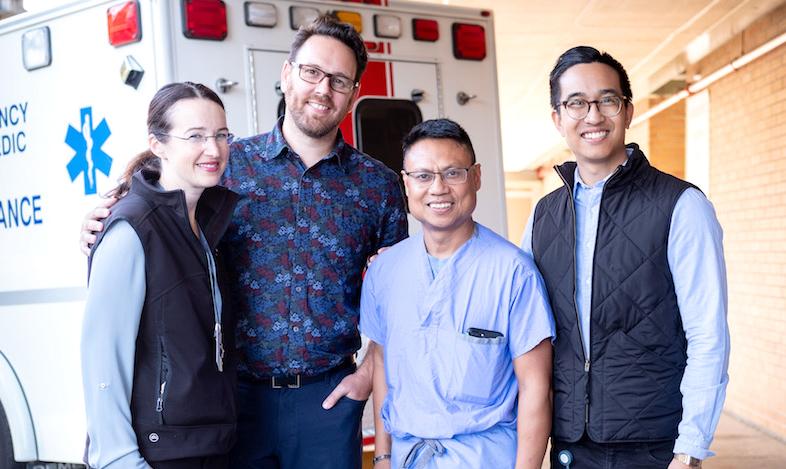
A patient centered approach for more effective communication with patients struggling with illicit opioid use.
Meet Team MotivatED (L-R): Susanne Moaedebi, Sebastien Payan, David Damian, Mark Ventura
A Lions Gate Hospital (LGH) emergency department (ED) team is learning how to better connect with patients with a history of illicit opioid use. A group of ED nurses is being trained in motivational interviewing, an evidence-based, person-centred approach to encourage behavior change and help EDs respond to the opioid crisis.
Dubbed “Team MotivatED”, the group includes staff from Lions Gate Hospital ED, nurses David Damian and Mark Ventura, and ED pharmacist Dr. Susanne Moadebi. Joining forces with the expertise of Sebastien Payan, a Motivational Interviewing Network of Trainers (MINT) candidate and a nurse educator for the Overdose Emergency Response/STOP HIV Team, Team MotivatED is eager to take on the challenge of finding solutions to the opioid crisis.
Reaching Patients with Illicit Opioid Use: Communication is key
Motivational interviewing is one approach staff can use to improve discussions and relationships with patients with illicit opioid use. One of the reasons it’s successful is that it recognizes that the care team member isn’t the expert about the patient’s substance use, the patient is. That simple recognition can also have a profound change on the culture within the ED and help remove the stigma around illicit opioid use.
The goal of motivational interviewing is to explore the patient’s own motivation for changing their illicit opioid use using a variety of tools such as open-ended questions, reflections and empathic listening. This patient-centered approach contributes to a more respectful and effective communication with patients struggling with illicit opioid use.
More than 30 LGH ED nurses have completed the one-day motivational interviewing training developed by Team MotivatED. LGH ED registered nurse Jennifer Thiel is one of these participants and she describes the training as, “… so realistic. It’s so helpful. I think all emergency nurses should have this training.”
Improved connections can lead to better outcomes
Motivational interviewing isn’t new to populations looking for behavior change. It’s been used successfully in working with people with a wide array of challenges from obesity, diabetes or alcohol addiction to chronic disease management.
The heightened focus on effective communication makes interactions between patients with illicit opioid use and ED care team members more productive and, in turn, makes it far more likely that patients struggling with addiction will get the help they need. Motivational interviewing is often used as in combination with other therapeutic modalities to increase overall treatment effectiveness.
A research study is being conducted concurrently with the training workshops and effectiveness/findings will be reported by mid-2019.
Funding partners play a large role
For Team MotivatED, a significant push that made addressing this crisis a reality came from a research challenge from the Vancouver Coastal Health Research Institute (VCHRI). Eric Liow, newly appointed Research Facilitator, Richmond and Coastal, encourages VCH nurses and other allied health staff to engage in research and innovation while still working in their respective clinical roles. As the recipient of a VCHRI Research Challenge 2017 grant, Team MotivatED was born. VCH Coastal Community of Care and the Lions Gate Hospital Foundation Women's Giving Circle also provided funding.
For more information on this innovative care technique and the Team MotivatED study, contact david.damian@vch.ca.


